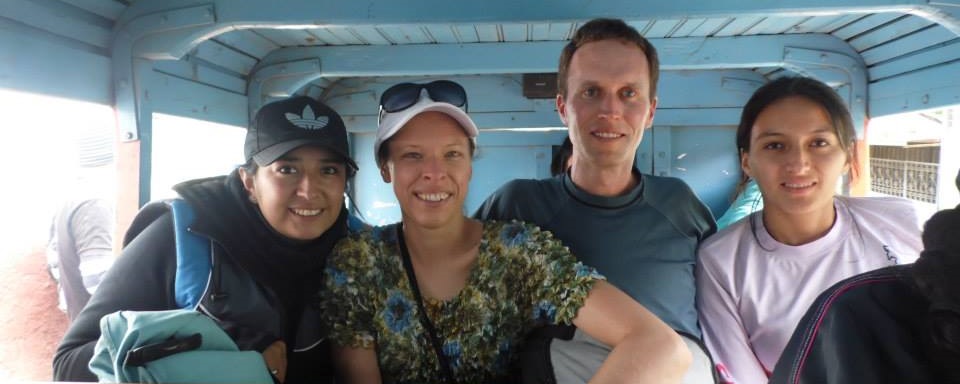Responsible Expatting: How to Be Welcomed
These days, Ecuador receives a lot of attention for being a paradise for expatriates—or expats. The cost of living, the climate, the wonderful people, the beautiful scenery and the slower pace of life tantalize us as we endure the hectic pace, commercialism, extreme temperatures and other shortcomings of life up here in the North. But do we stop to ask ourselves: do the Ecuadorians want us as much as we want their country? The answer to that question depends on a few things.
I think it is safe to say that Ecuador does want us, very much, as visitors. And a fine place to visit it is! I encourage travelers to leap on any opportunity they have to see this amazing country. Ecuador packs so much into its small size—only a little bigger than Colorado. It has four worlds in one: the rainforest (Amazon), the mountains (Andes), the beautiful Pacific coast, and the Galápagos Islands. Despite its beauty, there are special places in Ecuador that remain almost untouched by tourism—natural and pristine places, and even historical and archaeological sites that have seen very few visitors.
What about people who love Ecuador so much that they want to move there? Does Ecuador want them?
When we move abroad, we need to consider not only how that move will benefit us, but how it will impact the community we are moving into. Being a tourist in a place and living full time there are very different things. Tourism tends to be good for the economy, but expats can create an economic environment that can make the cost of living and acquiring property more difficult for the locals. Language barriers can also become a major problem for everyday living, inconveniencing both the locals and the expats. Locals usually appreciate and encourage tourism, but may feel apprehension about foreigners coming to live in their towns full time. It doesn’t help when foreigners create closed communities, shutting out any relationships with the locals. Not all expats do this, but too many do.
“I’ve seen a lot of expats that come and just stick to their own little group. One tries to approach them to extend friendship, and they are very closed–they are way too closed,” my Ecuadorian friend, Diego, said when I interviewed him for my book about Loja.
“I don’t think we can avoid the fact that more foreigners will want to move to Loja, because it is gaining popularity,” I said. Diego grimaced, nodded, and let out a long sigh. Then I said, “I hope that foreigners who do choose to move to Loja will do so because they want to get to know the people. That’s what I’d like to see.”
“We just hope that if they come, they come to contribute and to be part of the culture.”
“Let’s hope it works out that way,” he replied. “We haven’t yet seen many foreigners who have settled here permanently. We do see tourists, and there are some who come for a season, stay for a few months, but then return to their countries. But things are changing in Loja.”
Diego let out a wry laugh, then continued. “I actually boast that Lojanos are the friendliest people in the country—they’ve always told us that. The saying goes, ‘Al Lojano, donde quiera lo quiere.’ (The Lojano is loved everywhere.) Because of that very fact—people’s patience, cordiality and all of that—Loja will probably see a greater influx of tourists who are going to settle here. We just hope that if they come, they come to contribute and to be part of the culture.”
Sadly, this is not what most expats come for.
“Almost across the board, North Americans who are retiring to Ecuador do not learn Spanish. Most of them believe they will when they get to Ecuador, but they are coming to retire. They just want to hang out with their friends, who all speak English and not Spanish,” one of the rare expats who has successfully assimilated into the Ecuadorian community told me recently. “It makes living in Loja impossible for them, unless they just don’t like being around other people.”
Few people like this last more than a year in a town like Loja, which has almost nothing in the way of an infrastructure for expats. The few expats that do live there long term are the ones who have learned to integrate into the local culture. Towns with a much larger expat community—places like Vilcabamba and Cuenca—are much easier to move to when you can’t speak Spanish and don’t have a deeper understanding of the Latin American culture.
“I don’t see Loja getting taken over; I don’t think the people here would allow it.”
“I think that Vilcabamba was just taken over,” said another Loja expat. “I don’t see Loja getting taken over; I don’t think the people here would allow it. I don’t think it’ll be like Cuenca, either. Cuenca reminds me of the United States.”
I hope he’s right. One thing I will say about Loja is that it does seem to attract expats who want to be there precisely because of the culture and the lack of other expats. That’s what attracted us. Many foreigners discover that they don’t care for Loja as a place to stay long-term because the town doesn’t have all those built-in amenities to meet their needs.
The problem is that the towns who do have those amenities are becoming over-saturated with foreigners and losing the very qualities that made them such attractive places to begin with. Furthermore, the cultural rift between the locals and the newcomers in those places causes mistrust, frustration and resentment on both sides.
My recommendation is to adopt a mindset of “responsible expatting”—think about the contribution you will bring as a resident of the town—any town—you decide to move to. Commit to be patient, learn the ways of the culture, learn the language, and get out and openly mingle with the people. Don’t support irresponsible businesses that drive up the cost of living for everyone in the area and make it an unfriendly place to the original residents.
Loja is special…the locals know it and the few expats there know it. They don’t want it ruined or taken over, as some other communities in Ecuador have been.
“Without speaking the language it’s almost impossible to meet people, to understand things that for us are normal.”
I interviewed another friend and lifelong Loja resident, Adri. She said, “Without speaking the language it’s almost impossible to meet people, to understand things that for us are normal, and all of that. I feel that if someone disrespects our culture that will always be offensive. We welcome everyone here, but of course we ask just for respect for our traditions and our customs and things like that.” Adri teaches Spanish lessons to expats in Loja, and also provides services as a translator and teacher of local culture, helping newcomers to get set up in Loja.
Adri continued, “It’s better to read in advance about the country and cities where they are planning to go to, so they can know in advance more about the culture, the language, and lifestyle that Ecuadorians have. Information is the key, and it may help determine if they will feel comfortable here, and they will also know what to expect in a general way. I think that maybe [the reason] all these people are interested in moving here, is because of the nature, and what Ecuador has to offer to them; the delicious food; that it’s a safe country; it’s not expensive, which is really good…and most important it’s how the people in Ecuador are. I think they will have a really good experience if they decide to come and live here. I think they’re really going to like it.”
I sure loved Ecuador. However, having grown up in a Latin American country, I came with a good grasp of the language and a deeper understanding of the culture than what some expats would arrive with. Loja felt like home for me. I hesitated to write a book about Loja, because it’s tempting to keep such a special place a secret. However, with the increased media attention in recent years, people are beginning to look to Loja as a potential new home, and they are looking for answers. Like it or not, Loja is no longer a well-kept secret, but there is a lot of misinformation circulating on the internet.
Will Loja be the next big hot spot for expats? The e-book that I wrote attempts to answer that question in an honest way. For those looking at moving there, it provides resources for getting set up in the town and for becoming acquainted with the culture and learning Spanish and truly living like a local. The language and cultural sections of the book could apply to other parts of Latin America also. Above all, I try to help individuals considering moving abroad to think about how they can make the transition in a responsible way, so that the community will embrace them, adopt them as one of their own, and feel sad to ever see them go.
Interested in my book? Pick up a copy HERE.
If you have thoughts or opinions on the subject, feel free to share in the comments below.
Enter your name and email to receive my newsletter and stay up to date!
We hate spam as much as you. Your email is safe with us.

